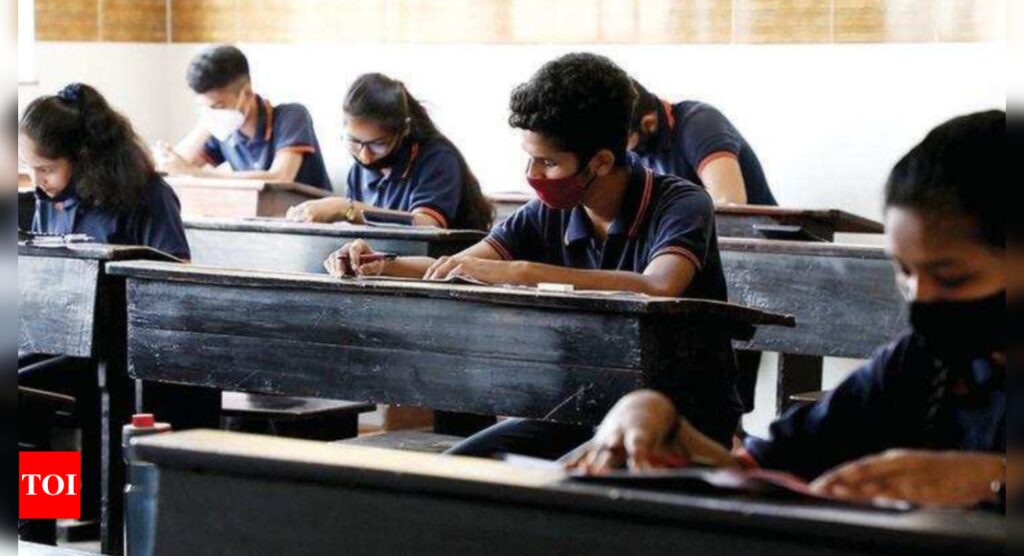NEW DELHI: The new curriculum framework for school education, based on which the new school textbooks will be designed, has suggested different formats of assessment and certification of vocational education, arts education and physical education, which have been made an integral part of school curricula.
Suggesting that good assessment should be constructive, developmental and learning focused, stage-appropriate and accommodate student diversity, NCF 2023 stated, “The fact that the life-determining board examinations are available only on two occasions, in grade 10 and 12, the pressure on students and families would naturally be high. Also, the current structure of board examinations forces students to concentrate only on a few subjects at the expense of others, preventing truly holistic development,” as it recommends that examinations be also seen as learning experiences, from which one can learn and improve in future, adding, “the current board examination system does not lend itself to this.”
Presenting the changes in assessment in schooling system, the draft cited the National Education Policy 2020 and quoted, “The aim of assessment in the culture of our schooling system will shift from one that is summative and primarily tests rote memorisation skills to one that is more regular and formative, is more competency-based, promotes learning and development for our students, and tests higher-order skills, such as analysis, critical thinking, and conceptual clarity….”
As per the draft NCF, “Assessment has two purposes – measuring achievement of student learning and gauging effectiveness of classroom processes and teaching materials in teaching and learning.”
It suggested three approaches to assessments – assessment ‘of learning’ (measurement of achievement of student learning), ‘for learning’ (evidence of student learning gathered by the teacher that provides inputs to guide the teaching-learning processes) and ‘as learning’ (when assessments are introduced as non-threatening tools for self-reflection and introspection).
Particularly critical of the current assessment systems, the document stated the stress of board examinations at class X and XII has repeatedly led to deep anxiety among students and families. They place an enormous amount of pressure on students over just a few days of their lives. For the foundational stage, the draft recommended assessment based on observations of the child and analysing artefacts that the child has produced as part of their learning experience, while for preparatory stage, it asked for “a comprehensive summative assessment of the student’s readiness to enter the middle stage”.
Suggesting that good assessment should be constructive, developmental and learning focused, stage-appropriate and accommodate student diversity, NCF 2023 stated, “The fact that the life-determining board examinations are available only on two occasions, in grade 10 and 12, the pressure on students and families would naturally be high. Also, the current structure of board examinations forces students to concentrate only on a few subjects at the expense of others, preventing truly holistic development,” as it recommends that examinations be also seen as learning experiences, from which one can learn and improve in future, adding, “the current board examination system does not lend itself to this.”
Presenting the changes in assessment in schooling system, the draft cited the National Education Policy 2020 and quoted, “The aim of assessment in the culture of our schooling system will shift from one that is summative and primarily tests rote memorisation skills to one that is more regular and formative, is more competency-based, promotes learning and development for our students, and tests higher-order skills, such as analysis, critical thinking, and conceptual clarity….”
As per the draft NCF, “Assessment has two purposes – measuring achievement of student learning and gauging effectiveness of classroom processes and teaching materials in teaching and learning.”
It suggested three approaches to assessments – assessment ‘of learning’ (measurement of achievement of student learning), ‘for learning’ (evidence of student learning gathered by the teacher that provides inputs to guide the teaching-learning processes) and ‘as learning’ (when assessments are introduced as non-threatening tools for self-reflection and introspection).
Particularly critical of the current assessment systems, the document stated the stress of board examinations at class X and XII has repeatedly led to deep anxiety among students and families. They place an enormous amount of pressure on students over just a few days of their lives. For the foundational stage, the draft recommended assessment based on observations of the child and analysing artefacts that the child has produced as part of their learning experience, while for preparatory stage, it asked for “a comprehensive summative assessment of the student’s readiness to enter the middle stage”.

